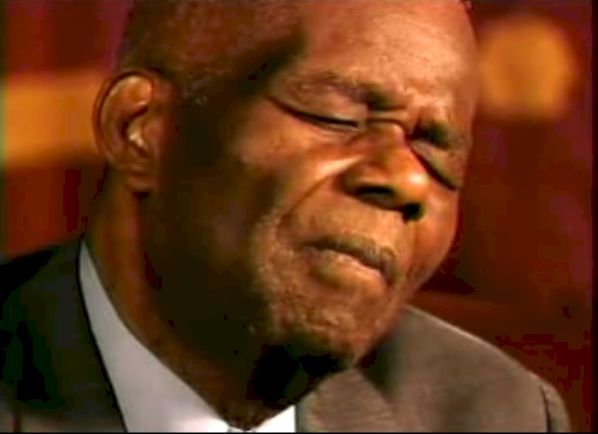
Day 6 features a stalwart of the Academic sphere, who illuminated Africa and its illustrious history on the world stage.
Dr. John Henrik Clarke (1915-1998) stands as an esteemed scholar and advocate for the comprehensive study and appreciation of African history and culture. Named John Henry Clarke at birth in Union Springs, Alabama, his early life was marked by the struggles of poverty and racial discrimination endemic to the Jim Crow South. Despite limited formal education growing up, his insatiable thirst for knowledge led him to become a self-taught historian and intellectual force. He would eventually go on to a bachelor’s degree, and a doctorate from Pacific Western University. However, his academic rise was viewed as unconventional.
Clarke’s journey to becoming a leading figure in African historiography began in Harlem, New York, where he changed his middle name to Henrik and added an “e” at the end of his last name. Clarke honed his understanding of the importance of reclaiming and preserving African heritage through his interactions with literary and intellectual giants such as Langston Hughes and Alain LeRoy Locke. His activism and scholarship were deeply intertwined, as he became a prominent voice in the civil rights movement, advocating for the inclusion of African history in educational curricula and challenging Eurocentric narratives of history. Clarke posited that many of the ideas credited to Greek philosophers in academia and popular thought were a result of the influence of African teachers in antiquity. So the African worldview, by extension, shaped Western thought.
Throughout his prolific career, Dr Clarke authored numerous books and scholarly articles, offering groundbreaking perspectives on African history and its global significance. His works including “African People in World History,” “Christopher Columbus and the Afrikan Holocaust,” and “Notes for an African World Revolution: Africans at the Crossroad”, challenged prevailing Eurocentric interpretations of history, asserting the agency and resilience of African peoples throughout the ages. Clarke taught at several institutions, including Hunter College–where he founded the Black and Purto Rican Studies Department–and Cornell University.
His dedication to uncovering and disseminating the truths of African history has thus inspired generations of scholars and activists, leaving an indelible mark on the study of the African diaspora. Dr. Clarke’s unwavering belief in the power of knowledge to liberate minds and transform societies ensures his place as a titan of African intellectual thought and a champion of historical truth.

There are so many books to be read and I agree with those referenced above. They speak of the aforementioned trail blazers.However, if we wish to deal with our current situation, I suggest we read “The falsification of Afrikan History” by professor Amos Wilson.
THE DAY I ASKED MYSELF WHILE SITTING IN CHURCH , WHERE IS BLACK PEOPLE IN ALL THIS TALK ABOUT GOD WAS THE DAY MY LIFE CHANGED. THIS QUESTION LED ME TO MR JOHN HENRY CLARKE AND I WENT DOWN THE RABBIT HOLE FROM THERE . CHANGED MY LIFE AND THE WAY I VIEWED SPIRITUALITY. THE COLONIZATION OF INFORMATION. WHY CANT MY GOD LOOK LIKE ME ? POWERFULL MR JOHN HENRY CLARKE .
As with previous heroes in this series, Dr. John Henrik Clarke’s life illustrates an important lesson for Dominicans. That being:
“Despite limited formal education growing up, his insatiable thirst for knowledge led him to become a self-taught historian and intellectual force… his academic rise was viewed as unconventional.”
It is regrettable that we all too often demean those without a conventional education. Had the advice of one such person been heeded by those claimed to be qualified, we would not be faced with the ongoing (fourteen years and counting) major civil engineering blunder at Antrim.
You might as well also do articles on Dr. Ivan Van Sertimer and Dr. Yosef Ben-Jochannan. These three individuals have contributed tremendously to Black history.
Indeed. They are like pioneers to African history. Dr. Ivan Van Sertima, from Guyana, wrote the book. “They Came Before Columbus.” We know that Columbus did not discover a thing. If we do not liberate our minds from religion, we will never rise as a people. How can the people who enslaved our ancestors give us a god that looks like them and to this day, we have all these images in the churches? That’s how much power they still have over us. My people, let go of that Jesus, which was and is not real. Start embracing our ancestors’ Spirituality in order to know ourselves again.
UNAPOLOGETIC
Indeed!
As shocking as my name sounds, these are our trailblazer ancestors who traveled the world, gathered information on African People and our history in order to correct the lies and distortions of that history by many state-sanctioned, State-sponsored European and European-American historians that flooded the world’s universities and libraries with their versions of African History when these ancestors became curious.
Van Sertima for instance, found out amidst all the noise, that Africans were here in the Americas thousands of years before Columbus was permitted by the vatican to enslave all the Black ones as infidels, from which we have not recovered to this day.